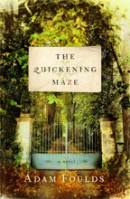A weekly roundup of noteworthy reviews from other sources.
 Ron Charles reviews The Quickening Maze by Adam Foulds, which was shortlisted for last year’s Booker Prize. It’s set at a British mental asylum around 1840, and follows several characters, including the poet John Clare. Charles: “These are difficult characters because they’re so easy to play for laughs or sentimentality, but Foulds conveys the profound loneliness of mental illness, the anxiety of being at least partially aware of one’s own peculiarity.” . . . Wyatt Mason addresses a new book based on interviews with David Foster Wallace (quoted in the post below this one), and moves on to a larger argument about Wallace, editing, modernism, and realism. . . . Second Pass contributor Alexander Nazaryan reviews a “uniformly excellent book” about the British Empire’s doomed efforts to conquer the Arctic. . . . Terry McDermott’s new book puts readers in the lab of a radical neuroscientist researching memory. Sara Lippincott admires the result. . . . David Levering Lewis calls Bruce Watson’s Freedom Summer, “a well-researched, vivid retelling of the 1964 civil rights crusade to put Mississippi’s 200,000 disfranchised blacks on the voting rolls.” . . . Sheila McNulty says: “When John Hofmeister wrote [Why We Hate the Oil Companies], the former president of Royal Dutch Shell’s US business could have had no idea it would be published amid an oil spill gushing into the Gulf of Mexico. The title he chose could not have been more apt.”
Ron Charles reviews The Quickening Maze by Adam Foulds, which was shortlisted for last year’s Booker Prize. It’s set at a British mental asylum around 1840, and follows several characters, including the poet John Clare. Charles: “These are difficult characters because they’re so easy to play for laughs or sentimentality, but Foulds conveys the profound loneliness of mental illness, the anxiety of being at least partially aware of one’s own peculiarity.” . . . Wyatt Mason addresses a new book based on interviews with David Foster Wallace (quoted in the post below this one), and moves on to a larger argument about Wallace, editing, modernism, and realism. . . . Second Pass contributor Alexander Nazaryan reviews a “uniformly excellent book” about the British Empire’s doomed efforts to conquer the Arctic. . . . Terry McDermott’s new book puts readers in the lab of a radical neuroscientist researching memory. Sara Lippincott admires the result. . . . David Levering Lewis calls Bruce Watson’s Freedom Summer, “a well-researched, vivid retelling of the 1964 civil rights crusade to put Mississippi’s 200,000 disfranchised blacks on the voting rolls.” . . . Sheila McNulty says: “When John Hofmeister wrote [Why We Hate the Oil Companies], the former president of Royal Dutch Shell’s US business could have had no idea it would be published amid an oil spill gushing into the Gulf of Mexico. The title he chose could not have been more apt.”

